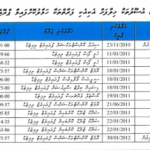Audit reports released in the first quarter of 2014 reveal financial transactions worth MVR2.2 billion (US$142 million) were conducted illegally by state institutions and corporations, according to the quarterly report (Dhivehi) of the audit office made public yesterday (April 29).
In the 14 audit reports released between January and March, the auditor general recommended recovering MVR294 million (US$19 million) from the officials responsible for the illegal expenditure.
These included MVR256.9 million (US$16.6 million) worth of unpaid dividends owed by state-owned corporations, MVR1.2 million (US$77,821) paid out as allowances to soldiers studying in the Maldives and overseas in addition to their basic salary, MVR166,324 (US$10,786) owed by an atoll councillor for residing in the atoll house free of charge, MVR23,927 (US$1,551) spent on plane tickets for a minister, and several millions owed by the Works Corporation.
The 14 reports covered the financial years 2011 and 2012 for a number of government ministries and companies, including the Defence Ministry, Finance Ministry, Civil Aviation Ministry and the Works Corporation.
The quarterly report noted that the auditor general also recommended that the Anti-Corruption Commission (ACC) investigate several cases of alleged corruption and embezzlement flagged in the 14 audits, which uncovered 163 instances of illegal expenditure or violations of public finance regulations.
In an appearance on state broadcaster Television Maldives in January, Auditor General Niyaz Ibrahim asserted that releasing audit reports was “futile” as the accountability process has so far failed.
While the audit office’s role was to conduct audits and review financial statements, Niyaz noted that the office was not legally empowered to file cases at court to recover funds or hold officials accountable for lapses.
Niyaz insisted that there was no political motive behind the timing of damaging audit reports, noting that the audit office adheres to a timetable or schedule shared with a parliamentary committee.
He also assured the public that the audit office was free of undue influence from any state official.





